
November-December 2021 Newsletter
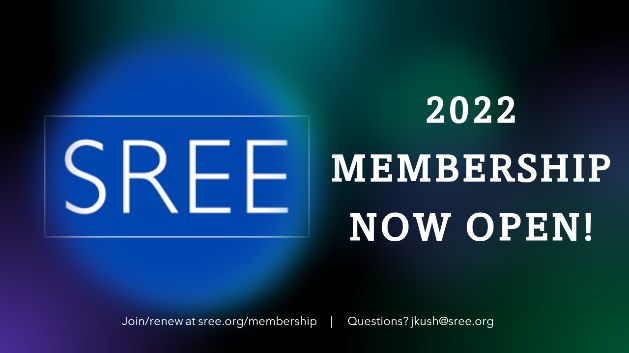
Upcoming Events

January-February (Date TBD): Career & Academic Disruptions due to COVID
Be on the lookout for more information on a panel discussion in late January - early February! This event is brought to you by SREE Researchers of Color and is sponsored by MDRC.
January 13, 2022 at 4:00pm - 4:45 pm ET: Sip with SREE ROC
Starting in January, SREE is pleased to offer a new monthly networking opportunity. Researchers of color and allies are welcome to join us on the second Thursday of each month to network, collaborate, ask questions, and connect with one another. Bring your beverage of choice!
September 21 - 24, 2022: SREE 2022 Conference
Renaissance Arlington Capitol View Hotel, Arlington, Virginia
Mark Your Calendars! Abstract submission will open in February.
A Note from the Executive Director

As 2022 comes to a close, I want to thank all of SREE’s members, conference, workshop and webinar attendees, sponsors, and volunteers. In a very challenging time, your commitment to SREE allowed the organization to continue its work to advance the generation and use of effectiveness research to solve pressing challenges in education through virtual offerings, including our annual conference. We are thankful for and encouraged by our conference attendees, who managed the transition from a hybrid event to an all-virtual format with grace and ease.
The Journal of Research on Educational Effectiveness (JREE) received “a record number” of submissions. SREE also offered webinars and workshops on research methods, use of research evidence in educational settings, culturally relevant and equitable evaluation, and critical issues in education research throughout the year. The SREE Researchers of Color met informally and also hosted webinars on June 15 and August 11. And for the first time, SREE was able to offer participation awards to researchers of color and hardship support in the amount of $1,095 for those in need to participate in the annual conference. The enthusiasm and energy at these events was incredible and I am excited to see these programs continue into 2022.
On behalf of the Board, thank you for being a part of SREE.
Ellen Weiss, Executive Director
Strategic Plan
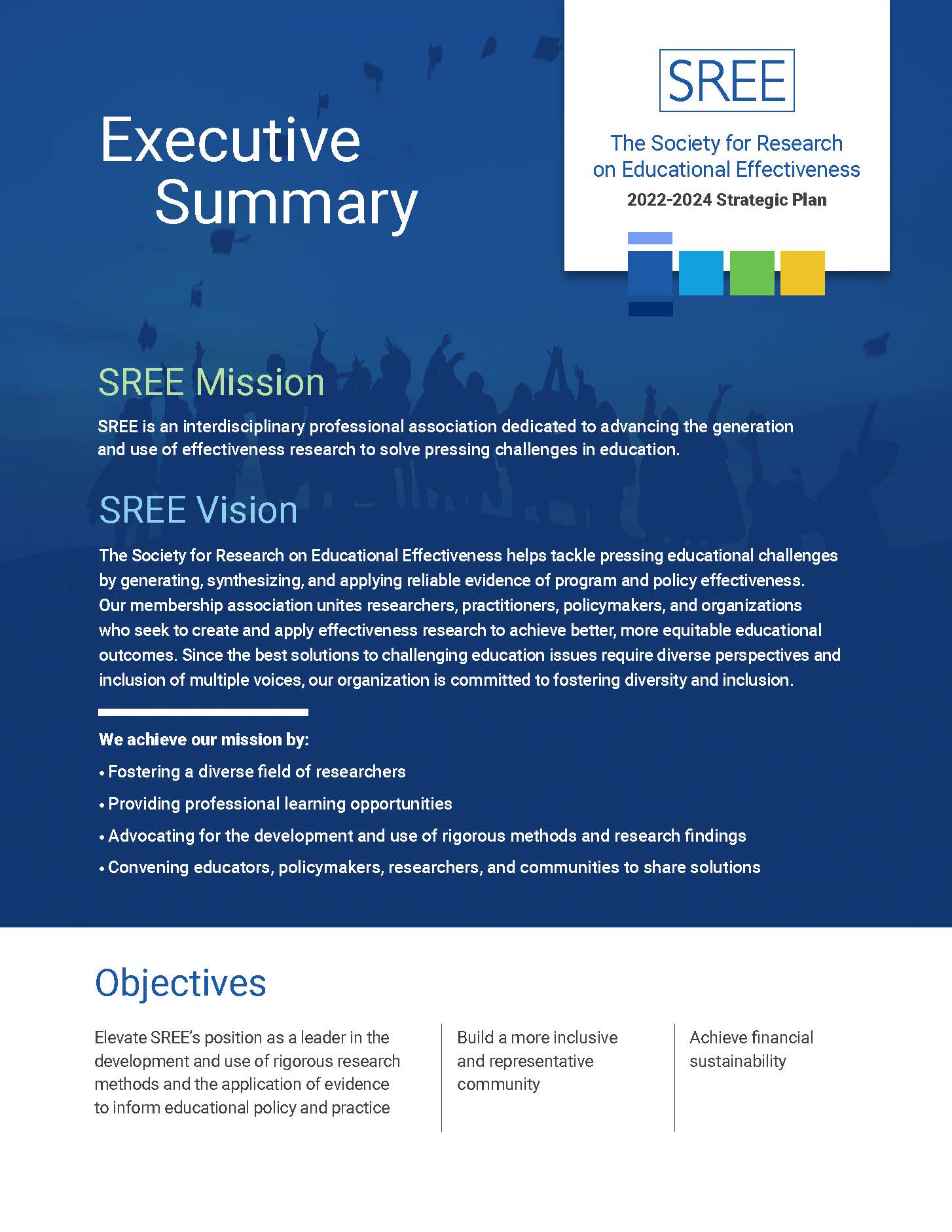
As SREE closes out 2021 and looks ahead to 2022, the SREE leadership team will be examining the Society's bylaws and programs with an eye towards diversity, equity, and inclusion. The fundamental goal of these efforts is to ensure policies and processes are inclusive.
If you have ideas, be sure to send them to [[email protected]][email protected]!
You can read more about the strategic plan here.
Board of Directors Announcements
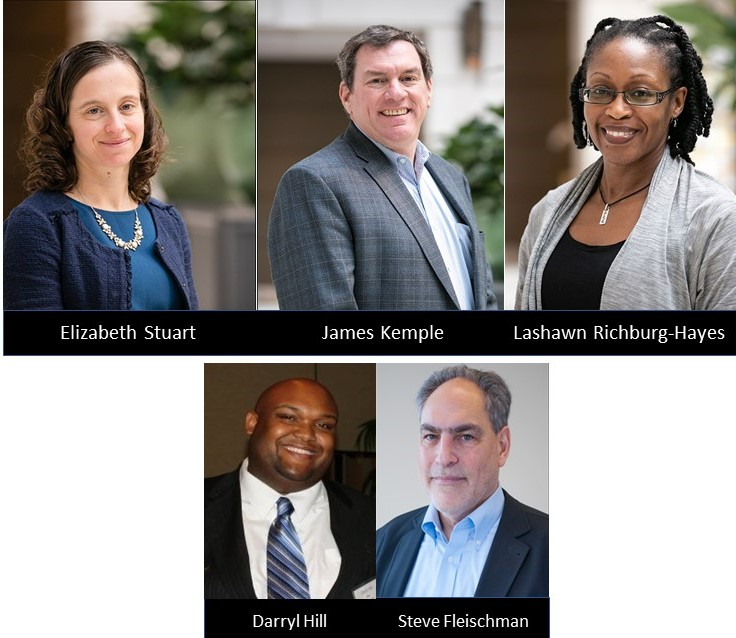
SREE is pleased to announce that beginning January 1, 2022, Elizabeth Stuart, Johns Hopkins Bloomberg School of Public Health, will begin her term as President. James Kemple, Research for Action, will step into the role of President-Elect, and Lashawn Richburg-Hayes will become Past-President.
Darryl Hill, from the Bill and Melinda Gates Foundation will be joining the Board for a three-year term.
SREE thanks out-going Board member Steve Fleischman for his service.
Open Science Updates at JREE 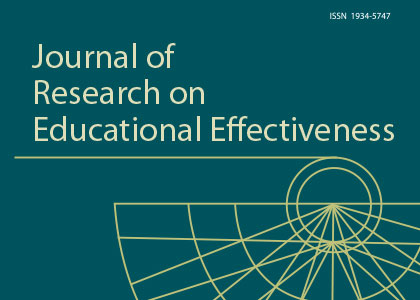
JREE supports the movement in the scientific ecosystem toward empirical research that is more transparent, open, and reproducible. Consistent with JREE’s values, it is our view that open science facilitates the alignment of scientific practice with scientific ideals, accelerates scientific discovery, broadens access to scientific knowledge, and improves the credibility of empirical research on the effectiveness of educational interventions. To operationalize this support of open science, JREE is a signatory of the Transparency and Openness Promotion (TOP) Guidelines: a set of modular standards for moving published empirical research toward greater openness.
Starting in Q1 of 2022, JREE will be a “Level 1” implementer of all standards in the TOP Guidelines. As a “Level 1” implementer, JREE will require authors to disclose whether or not they have used open science practices in the TOP Guidelines. In other words, while we will not require the open science practices themselves for publication, we will require authors to disclose whether or not studies included the following practices and include this disclosure in all articles:
● Study and Analysis Plan Preregistration: whether or not the study was registered (e.g., in the Registry of Efficacy and Effectiveness Studies) and, if registered, whether the registration was prospective and included an analysis plan.
● Data, Code, and Materials Transparency: whether or not the data, code, and other materials (e.g., questionnaires, surveys, instructions) used to conduct the research are publicly available—and, if available, where and how to access them.
● Citation Standards: authors should cite all data, code, and other materials in-text and in the references section, if possible.
● Design and Analysis Reporting Guidelines: for randomized trials and systematic reviews, authors will be encouraged to develop their manuscripts in adherence with checklists developed by the Editors (based on CONSORT-SPI and PRISMA, respectively).
● Publication Bias: authors will be asked to confirm that their manuscript is an honest, accurate, and transparent account of the study being reported.
● Replication: authors will be asked to indicate whether their study is a replication of a previous study—and, if so, provide a citation to that study.
To implement these policies, all manuscripts that move beyond initial review will be asked to complete a “TOP Guidelines Disclosure Form” upon resubmission. This form will ask for details about each of the above practices, which will then inform disclosure statements in all published articles, as well as the awarding of Open Science Badges for qualifying articles. In addition, JREE explicitly welcomes replication studies, as well as papers with strong methods that find null or negative results.
Any questions or feedback about these upcoming changes and drafts of associated forms are most welcome to Methodological Transparency Editor, Sean Grant, [email protected].
JREE Randomized Trial Checklist
JREE Top Disclosure Form
JREE Systematic Reviews Checklist
Early Career Award Nominations Open

Nominations for 2022 are open until January 14, 2022. This award recognizes early career scholars whose work has advanced rigorous research relevant to educational practice. Both self-nominations and nominations of others will be accepted. If you’d like to nominate someone with whom you do not have a direct relationship, you can submit their name and SREE will reach out for the requested material on your behalf. Information on the requested material and the nomination process can be found here.
Criteria for selection: (1) quality of research; (2) relevance / contributions of research to educational practice; and (3) contributions to / participation in SREE.
Member Spotlight
Read more here.SREE Member, Ruth López Turley, a prolific education researcher, professor of sociology, and director of Rice University's Houston EducationResearch Consortium (HERC), has been selected as the next director of the university's Kinder Institute for Urban Research after current director Bill Fulton steps down June 30, 2022. Turley, who currently serves as an associate director for the Kinder Institute, has been at Rice since 2010. Raised on the U.S.-Mexico border, she experienced firsthand the hardships caused by educational inequities. That inspired her academic work and led her to found HERC, which brings researchers and school district leaders together to improve educational opportunities for all students. She also founded the National Network of Education Research-Practice Partnerships, which develops and connects partnerships like HERC across the nation.
Education Research and the Place-based Funder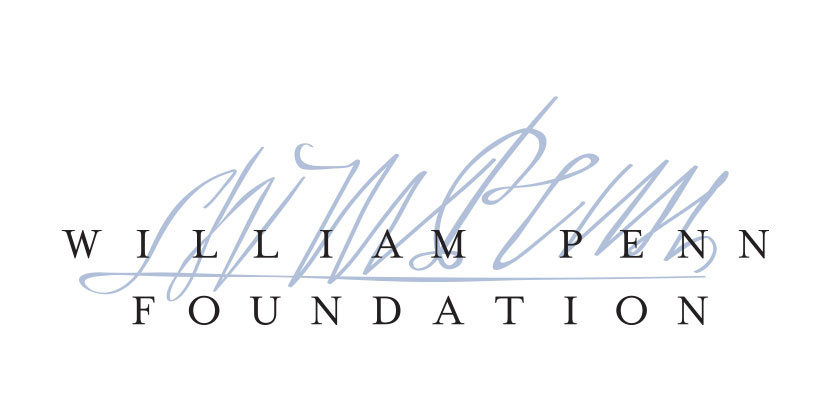
In an article for SREE, Elliot Weinbaum of the William Penn Foundation discusses the unique research goals of a place-based funder:
To be effective at improving education within a geographic boundary, as is the mission of the William Penn Foundation and hundreds of private and community foundations across the country, we need to understand deeply what is happening, what is needed, and what might be most effective in our region. For us, using existing research is a starting point, but is not sufficient to catalyze improvement. And funding large-scale national studies is unlikely to advance our specific goals anytime soon. But supporting research that is developed collaboratively with educators and policymakers in our regions, research that is sensitive to the unique characteristics of our people, economy, public systems, and history, is an essential part of our work.
Read more here.
Institutional Member Corner
Harvard Strategic Data Project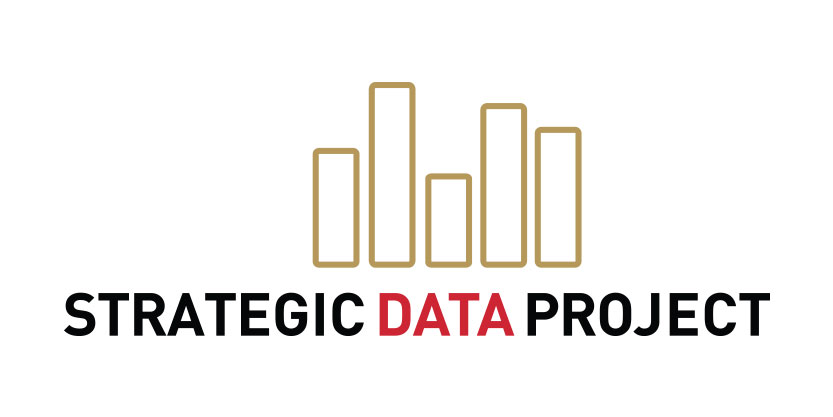
Applications are open for the Strategic Data Project Fellowship and virtual Institute! Since 2009, SDP has trained more than 850 education data leaders through our two-year Fellowship program and short-term Institute for Leadership in Analytics. Read on for more information and how to apply.
The Strategic Data Project (SDP), a program of the Center for Education Policy Research, a nonprofit organization, is housed in Harvard University’s Graduate School of Education. SDP is currently accepting applications for our Fall 2022-Summer 2024 Fellowship with placements in PK12 and Higher Education organizations and systems and for our Spring and Summer 2022 virtual SDP Institute modules (Education Data Strategy; Data Ethics & Equity; and Data Visualization & Communication).
SDP finds and develops data leaders to uncover trends, measure solutions, and effectively communicate evidence to stakeholders in education. The SDP Fellowship program provides a unique opportunity for passionate quantitative researchers and data strategists who want to put their skills to work to improve public education. SDP Fellows are placed in PK12 and Higher Education school systems and education organizations across the country as full-time employees for two years, where they will affect positive change and execute on a key analytic project for their placement while accumulating skills and experiences that can advance their careers. Learn more about former fellows’ work at sdp.cepr.harvard.edu/blog.
We’re seeking future data leaders who are committed to improving outcomes for all students across the PK12 and/or Higher Education landscape. Eligible candidates will have a Masters or PhD by summer 2022, 4 years minimum of full-time work experience, a strong quantitative skillset, and emerging leadership and communication skills. Upcoming application deadlines are January 18 and March 21. Visit our website to learn more at sdp.cepr.harvard.edu.
The SDP Institute is a short-term, virtual training opportunity which offers participants virtual modules to customize their experience based on urgent needs and interests. Eligible participants are currently employed by an education organization or school system and can attend one or more modules. The Spring deadline is January 5. Learn more at https://sdp.cepr.harvard.edu/institute.
Questions? Email [email protected].
Ready to apply for the Fellowship or Institute? Visit sdp.cepr.harvard.edu/apply
University of Maryland College of Education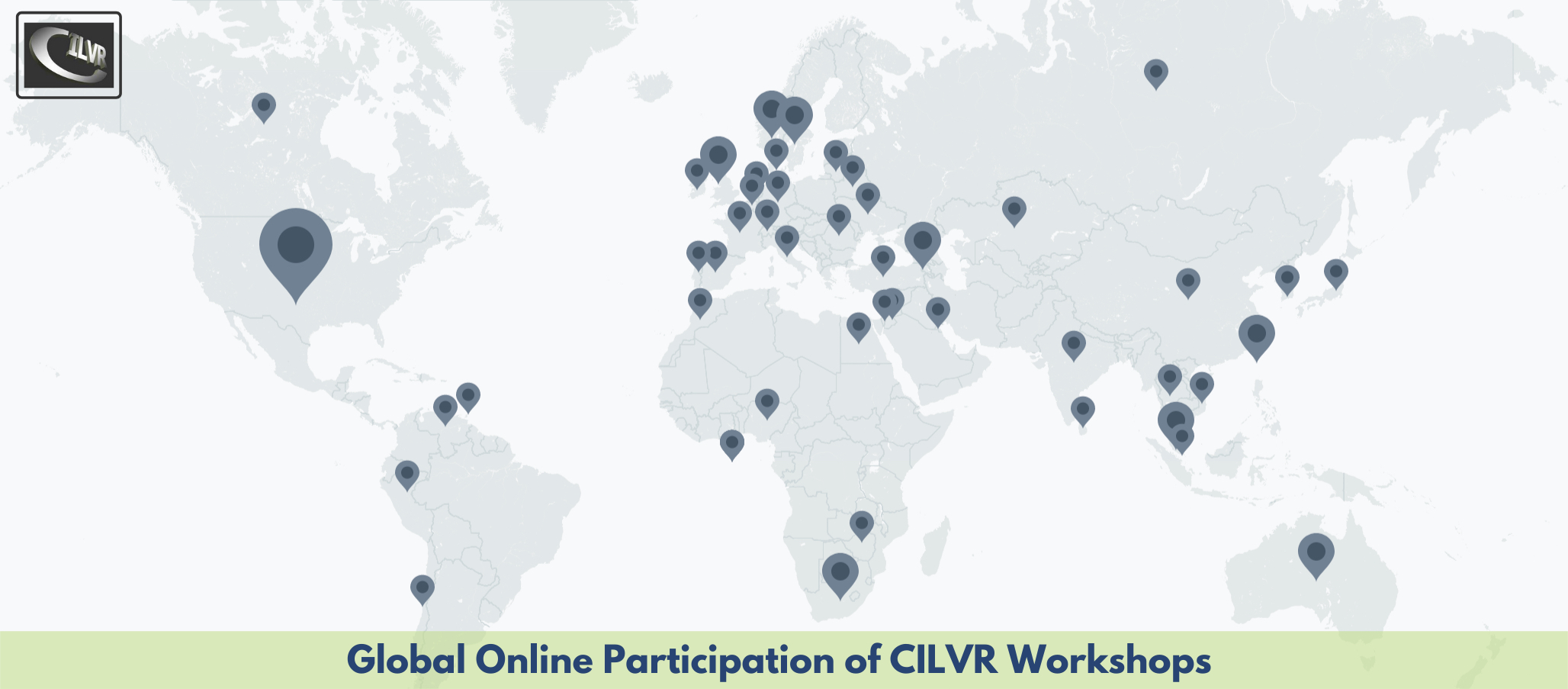
University of Maryland-Online Quantitative Methods Short Course Series Offered by Center for Integrated Latent Variable Research (CILVR)
Housed within the Measurement, Statistics and Evaluation (EDMS) program in College of Education at the University of Maryland, CILVR has been offering state-of-the-art quantitative methods training across a wide range of topics. Over the years, CILVR has continued to host onsite and online short courses series for graduate students, emerging scholars, and continuing researchers in different disciplines across the world who are seeking for in-depth treatment of applied statistical methods. CILVR is pleased to announce the online quantitative methods short course series in Academic Year 2021-2022. Participants can register to attend synchronously and/or asynchronously. For any inquiries and questions about the short course offerings, please contact [email protected].
CILVR Short Course Series 2021-2022
Analysis of Complex Survey Data (from NCES)
Nov 19-20, 2021 (registration remains open for asynchronous access)
Dr. Laura Stapleton (University of Maryland)
Introduction to Social Network Analysis
Dec 10-11, 2021
Dr. Tracy Sweet (University of Maryland)
Structural Equation Modeling: From Beginner to Intermediate
Jan 3-5, 2022
Dr. Gregory R. Hancock (University of Maryland)
Introduction to Longitudinal Structural Equation and Latent Growth Modeling
Jan 19-21, 2022
Dr. Gregory R. Hancock (University of Maryland)
Questionnaire Item Writing
Feb 19, 2022
Dr. Debbi Bandalos (James Madison University)
Introduction to Meta-analysis
Mar 11-12, 2022
Dr. Joshua Polanin (American Institutes for Research)
Multilevel Modeling
April 28-29, 2022
Dr. Laura Stapleton (University of Maryland)
Introduction to Machine Learning for the Social Sciences
May 19-20, 2022
Dr. Tracy Sweet (University of Maryland)
Bayesian Statistical Modeling: A First Course
June 6-8, 2022
Roy Levy (Arizona State University)
Bayesian Statistical Modeling: Advanced Topics
June 9 & June 10, 2022
Roy Levy (Arizona State University)
Thank you to our Sponsors and Institutional Members for your support in 2021!
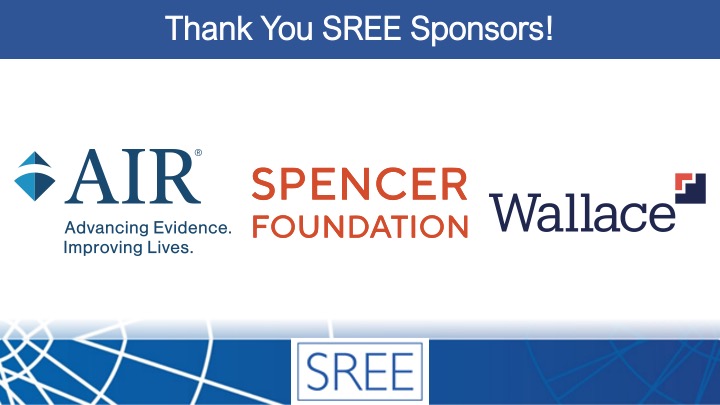
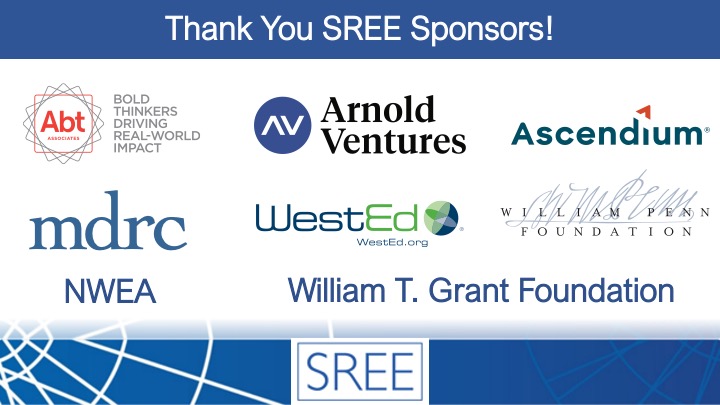
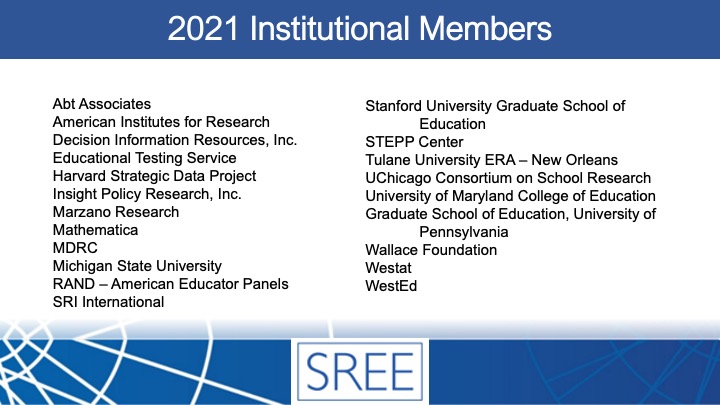
Job Board
| |
FEATURED Data Analyst/Scientist
Office of District of Columbia Auditor - Washington, DC
Full-time
|
Posted: Nov 29, 2021
Salary: $77,649.00 - $136,208.00 Annually
Application Deadline: N/A
|
 |
FEATURED Director of Research
PowerMyLearning
Full-time
|
Posted: Nov 6, 2021
Application Deadline: N/A
|
| |
Assistant Director for Research
Education Policy Innovation Collaborative (EPIC) College of Education Michigan State University - East Lansing, MI
Full-time
|
Posted: Dec 10, 2021
Salary: null Annually
Application Deadline: N/A
|
| |
Postdoctoral Research Associate
Education Policy Innovation Collaborative (EPIC) Michigan State University - East Lansing, MI
Full-time
|
Posted: Dec 10, 2021
Salary: null Annually
Application Deadline: N/A
|
Support SREE in Your Year-End Giving
Did you know that you can make a tax-deductible donation to SREE? Your investment allows us to support the Journal of Research on Educational Effectiveness, student and government employee attendance at the SREE conference, and professional development opportunities.
If you choose to make a gift in honor or memory of someone, we can send a notification of your gift to an individual designated by you.
|
















